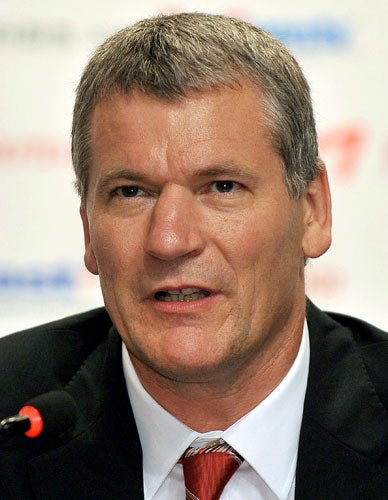We will not compete in wage game, say United
Chief executive defends ‘sensible’ model in response to rivals’ financial muscle

Manchester United have admitted that they are no longer able to match the wages paid by Manchester City or Real Madrid in the wake of this summer's boom in the transfer market.
United's chief executive, David Gill, said yesterday he would not jeopardise the club's long-term future – which depends on the wage bill being kept below 50 per cent of turnover – by engaging in auctions with clubs who do not abide by normal economic rules. Even Chelsea, who were able to offer Frank Lampard, Michael Ballack and John Terry salaries of around £150,000 a week, would have to sell before they bought, Gill said.
"I don't know if I would call [the wages paid by Madrid and City] obscene but it has certainly gone to very high levels," Gill said. "We have our own models and targets and are operating within those. We are not at the whim of some owner pulling out because he has lost interest."
Gill underlined United's recently adopted policy in the transfer market of targeting younger players in preference to so-called marquee signings. "We are not in the market for 27, 28 or 29-year-olds for loads of money. It doesn't make sense. We are not interested," he said. "Last year we did it for Dimitar Berbatov but that was the one slot that Alex Ferguson felt had to be filled. But, generally, that is not a road we are interested in going down.
"You ask yourself if it makes sense. You put in £25m-£30m to buy these players and then you add on the cost per year of the contracts. So you have to ask yourself what you would be left at the end of it.
"As you can imagine, when Cristiano Ronaldo left I was inundated by agents offering this player or that player. But you have to ask if they were motivated at 28 or 29 to come to the Premier League and are they United players? We are about young players and giving youth its chance. That is what we want to do.
"You read about how Mr Abramovich is feeling. I haven't spoken to him about it but they say Chelsea have to bring in money before they do any transfers. I just feel that Manchester United has been around since 1878 and our job is to make sure it is still around for many more years by operating in a sensible fashion and that is by generating our own income."
Despite United's turnover, which at £257.1m puts them behind only Real Madrid in world football, they have rarely paid enormous salaries. Ten years ago wages made up only 33 per cent of expenditure and, although that has risen, they are on course to take it below 50 per cent, a target insisted on by their owners, the Glazer family. United have to meet interest payments of £43m to service their debt.
By contrast, according to the accounts for the 2007-08 season, for every pound Chelsea made, 84.5p went to pay the squad – United's figure was 56p – which contributed to a £70m loss. Even before Manchester City's takeover by the Abu Dhabi United group, wages accounted for 65.9 per cent of the club's income. With spending of £200m since ADU's takeover, it is likely that every penny earned by Manchester City will go to pay Mark Hughes' players.
Madrid, too, have changed course. When David Beckham arrived at the Bernabeu in 2003, he signed what was known as the "standard galactico contract" of €6m (£5.16m) a year. Ronaldo will earn more than half as much of that again this season with 25 per cent increases in each year of his contract.
Gill insisted that United had negotiated seriously with Carlos Tevez's agent, Kia Joorabchian, who owned the Argentine's registration but that, having paid £9m for his two-year loan period, they could not swallow another £25m to make the contract permanent.
"We paid them £4.5m each season for two sets of loan fees," Gill. said "But we would have been uncomfortable extending that arrangement in terms of another loan.
"Even around Christmas, Carlos was making noises – not directly to me but through Joorabchian – about his concerns at not being picked for the big games or being a member of the first-choice XI. We were genuinely discussing what we wanted to do, but we genuinely felt even before those big deals started happening at the end of the season that £25m was a bit rich.
"We also made a substantial bid for Karim Benzema but he decided he wanted to go to Madrid. We moved quickly for Michael Owen, although that had been a situation we had been looking at for a year or so."
Changing times: Top-flight spending
Manchester City's wage bill for the 2007-08 season, the most recent available, was only the seventh highest in the Premier League.
Chelsea £172m
Manchester United £121.1m
Arsenal £101.3m
Liverpool £90m
Newcastle United £79.3m
Portsmouth £54.7m
Manchester City £54.2m
Join our commenting forum
Join thought-provoking conversations, follow other Independent readers and see their replies
Comments
Bookmark popover
Removed from bookmarks